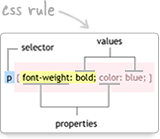Take for example the following link that is supposed to take me to a newspaper article. The Google search results page certainly looks as if I will directly go to the newspaper's site but that's not what really happens behind the scenes. While the yellow portion of the link is where I chose to go - my actual and eventual destination - the unhighlighted portion has been inserted into the link string by Google without my knowledge.

So before I view the newspaper article, I will go through Google where they will collect more information on me although this portion of my journey will be invisible to me.
If you want to see how this works, go to google.com and search on something. You'll get the usual search results page that all of us are familiar with. Right click on one of the links and choose "Copy Link Location". You'll find out that the link is reconstructed such as the one I have above and looks different than what Google's showing you on their search results page.
To understand what this means for the user:
"Google knows too much about you" | EU Data Initiative
The popularity of a relatively new service called DuckDuckGo, which offers searches without user tracking, storing of IP addresses or unique user agent strings, might force big name search engine companies to reconsider how they handle user data.

















































Post a Comment
Note: Only a member of this blog may post a comment.